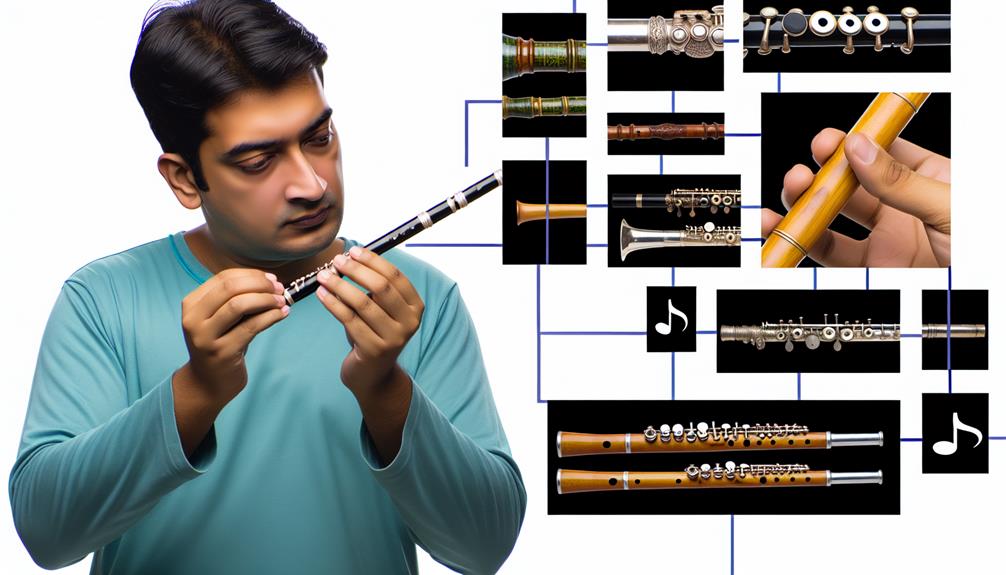When embarking on the journey of selecting your first flute, there are several crucial considerations to ponder. The complexity of this decision goes beyond merely picking an instrument; it involves a blend of factors that will shape your musical experience.
From exploring the diverse types of flutes available to understanding the nuances of key features and materials, each choice holds significance. However, the ultimate key to unlocking the perfect flute lies in a particular aspect that often gets overlooked – a factor that can make or break your musical aspirations.
Key Takeaways
- Consider materials, key systems, and headjoint style for your first flute.
- Factor in budget for quality, brand, and accessories.
- Try out flutes to assess comfort, sound quality, and musical suitability.
- Seek guidance on reputable brands, testing, care, and community support.
Types of Flutes to Consider
When considering the types of flutes to purchase, it is important to understand the differences between key considerations such as material, mechanism, and sound quality. Flutes are commonly made from materials like silver, nickel silver, and various types of metals. Each material can affect the tone and durability of the instrument.
The mechanism of a flute refers to the keys and how they operate. Some flutes have plateau keys, while others have open-hole keys, each offering a unique playing experience. Additionally, sound quality is crucial when selecting a flute. A good quality flute will produce clear, resonant tones across all registers.
Furthermore, the type of flute you choose should align with your musical goals and preferences. For beginners, a student flute made of durable materials with a straightforward mechanism may be suitable. As you advance, you may consider upgrading to a professional flute with higher-quality materials and a more complex mechanism for enhanced playability and tone.
Ultimately, selecting the right type of flute is a personal decision that should be based on your level of expertise and musical aspirations.
Factors to Determine Your Budget
Considering the financial investment required for purchasing a flute, it is essential to evaluate several key factors that can help determine an appropriate budget. When setting your budget for buying your first flute, you should take into account the following factors:
- Quality: Determine the level of quality you desire in your flute, as this will greatly impact the price range.
- Material: Different materials, such as silver, gold, or nickel, can significantly affect the cost of the flute.
- Brand: Established brands often come with a higher price tag due to their reputation and craftsmanship.
- Accessories: Consider additional costs for essential accessories like a case, cleaning supplies, and a music stand.
- Long-term Goals: Reflect on your commitment to playing the flute and how it aligns with your budget for a more informed decision.
Importance of Trying Out Flutes
To make an informed decision when choosing your first flute, it is crucial to recognize the significance of personally trying out different instruments. Trying out flutes allows you to assess how comfortable you feel holding and playing the instrument. Each flute has unique qualities that may affect your playing experience, such as the weight, balance, and ergonomics. By trying out different flutes, you can determine which one feels the most natural and comfortable for you, ultimately enhancing your playing performance.
Additionally, trying out flutes enables you to assess the sound quality and projection of each instrument. The tone produced by a flute can vary based on factors like the material, construction, and craftsmanship. By personally testing out flutes, you can identify which one produces a tone that resonates with you and suits your musical preferences.
Understanding Key Features and Materials
Exploring the key features and materials of a flute is essential for gaining a comprehensive understanding of the instrument's construction and capabilities. When selecting your first flute, it's crucial to consider the following aspects:
- Material: Flutes are commonly made from materials like silver, nickel silver, or various types of metals. Each material can affect the sound quality and durability of the instrument.
- Key System: Flutes come in different key systems, such as closed-hole or open-hole keys. The key system can impact playability and the types of music you can perform.
- Headjoint Style: The headjoint plays a significant role in tone production. Common headjoint styles include straight, curved, or a combination of both.
- Offset G Key: Some flutes feature an offset G key, which can make it more comfortable for players with smaller hands to reach and play.
- Split E Mechanism: Flutes may have a split E mechanism, aiding in producing a clearer high E note, which can be beneficial for advancing players.
Understanding these key features and materials will help you make an informed decision when choosing your first flute.
Seeking Guidance From Experienced Players
Drawing upon the expertise of seasoned flute players can provide invaluable insights for newcomers navigating the world of selecting their first instrument. Experienced players have a wealth of knowledge that can help beginners make informed decisions based on personal preferences and playing styles. By seeking guidance from those who have spent years honing their craft, aspiring flutists can benefit from recommendations on reputable brands, ideal flute models for beginners, and tips on how to test and select a flute that suits their needs.
Connecting with experienced players also offers the opportunity to receive practical advice on caring for a flute, developing proper playing techniques, and finding reputable teachers or resources for further learning. Moreover, building relationships with seasoned musicians can create a sense of community and belonging within the flute-playing world, fostering encouragement and support for those embarking on their musical journey.
Frequently Asked Questions
Are There Any Specific Maintenance Tips for Beginners to Keep Their Flute in Good Condition?
For beginners, it's essential to maintain your flute in good condition. Regularly clean your flute after each use with a cleaning rod and cloth. Keep it stored in a protective case when not in use, and have it serviced by a professional periodically.
How Do I Know if a Flute Is the Right Size for Me?
To determine if a flute is the right size for you, consider the reach to comfortably cover the keys, the ability to maintain proper hand position, and the ease of producing a clear tone. Comfort and ergonomics are key in selecting the ideal flute size.
What Accessories Should I Consider Purchasing Along With My First Flute?
When selecting accessories for your first flute, consider essential items like a cleaning rod, cloth, and case for proper maintenance and protection. Optional accessories may include a metronome, music stand, and beginner flute music books.
Can I Upgrade My Flute in the Future, or Should I Invest in a Higher Quality One From the Start?
Upgrading a flute in the future is common as players develop. However, investing in a higher-quality flute initially can provide better sound, durability, and longevity. Consider your commitment level and goals to make the best decision.
Are There Any Online Resources or Communities for Beginner Flutists to Connect With Others and Seek Advice?
Online resources like flute-specific forums, social media groups, and educational websites provide valuable connections for beginner flutists seeking advice, sharing experiences, and building a supportive community. Engaging with these platforms can enhance your learning journey.
Conclusion
In conclusion, choosing the right flute involves considering various types, budget factors, trying out different options, understanding key features and materials, and seeking guidance from experienced players.
An interesting statistic to note is that the flute is one of the oldest musical instruments, with evidence of its existence dating back to over 35,000 years ago. This rich history highlights the enduring popularity and importance of the flute in music.

